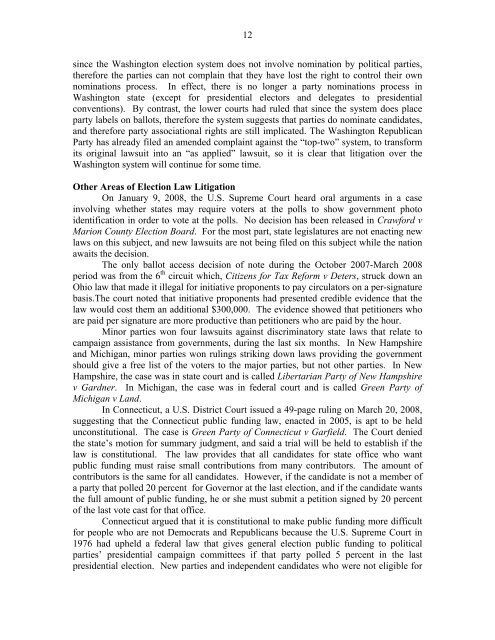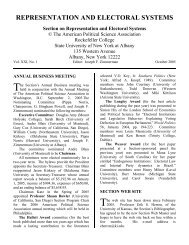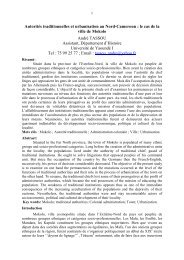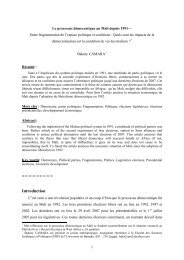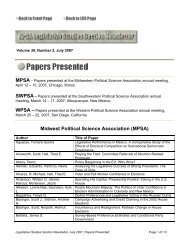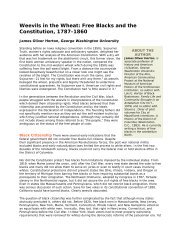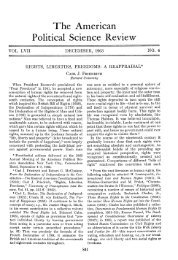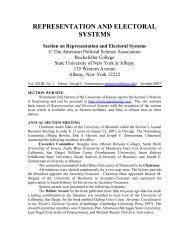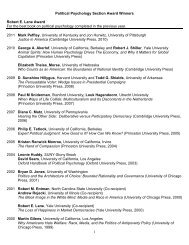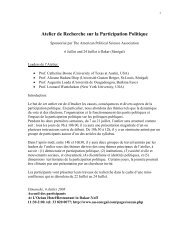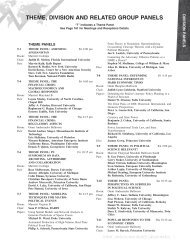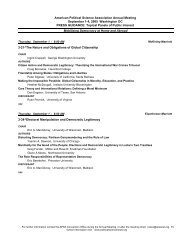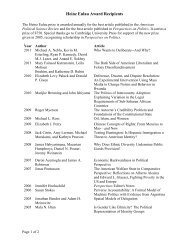representation and electoral systems - American Political Science ...
representation and electoral systems - American Political Science ...
representation and electoral systems - American Political Science ...
You also want an ePaper? Increase the reach of your titles
YUMPU automatically turns print PDFs into web optimized ePapers that Google loves.
12<br />
since the Washington election system does not involve nomination by political parties,<br />
therefore the parties can not complain that they have lost the right to control their own<br />
nominations process. In effect, there is no longer a party nominations process in<br />
Washington state (except for presidential electors <strong>and</strong> delegates to presidential<br />
conventions). By contrast, the lower courts had ruled that since the system does place<br />
party labels on ballots, therefore the system suggests that parties do nominate c<strong>and</strong>idates,<br />
<strong>and</strong> therefore party associational rights are still implicated. The Washington Republican<br />
Party has already filed an amended complaint against the “top-two” system, to transform<br />
its original lawsuit into an “as applied” lawsuit, so it is clear that litigation over the<br />
Washington system will continue for some time.<br />
Other Areas of Election Law Litigation<br />
On January 9, 2008, the U.S. Supreme Court heard oral arguments in a case<br />
involving whether states may require voters at the polls to show government photo<br />
identification in order to vote at the polls. No decision has been released in Crawford v<br />
Marion County Election Board. For the most part, state legislatures are not enacting new<br />
laws on this subject, <strong>and</strong> new lawsuits are not being filed on this subject while the nation<br />
awaits the decision.<br />
The only ballot access decision of note during the October 2007-March 2008<br />
period was from the 6 th circuit which, Citizens for Tax Reform v Deters, struck down an<br />
Ohio law that made it illegal for initiative proponents to pay circulators on a per-signature<br />
basis.The court noted that initiative proponents had presented credible evidence that the<br />
law would cost them an additional $300,000. The evidence showed that petitioners who<br />
are paid per signature are more productive than petitioners who are paid by the hour.<br />
Minor parties won four lawsuits against discriminatory state laws that relate to<br />
campaign assistance from governments, during the last six months. In New Hampshire<br />
<strong>and</strong> Michigan, minor parties won rulings striking down laws providing the government<br />
should give a free list of the voters to the major parties, but not other parties. In New<br />
Hampshire, the case was in state court <strong>and</strong> is called Libertarian Party of New Hampshire<br />
v Gardner. In Michigan, the case was in federal court <strong>and</strong> is called Green Party of<br />
Michigan v L<strong>and</strong>.<br />
In Connecticut, a U.S. District Court issued a 49-page ruling on March 20, 2008,<br />
suggesting that the Connecticut public funding law, enacted in 2005, is apt to be held<br />
unconstitutional. The case is Green Party of Connecticut v Garfield. The Court denied<br />
the state’s motion for summary judgment, <strong>and</strong> said a trial will be held to establish if the<br />
law is constitutional. The law provides that all c<strong>and</strong>idates for state office who want<br />
public funding must raise small contributions from many contributors. The amount of<br />
contributors is the same for all c<strong>and</strong>idates. However, if the c<strong>and</strong>idate is not a member of<br />
a party that polled 20 percent for Governor at the last election, <strong>and</strong> if the c<strong>and</strong>idate wants<br />
the full amount of public funding, he or she must submit a petition signed by 20 percent<br />
of the last vote cast for that office.<br />
Connecticut argued that it is constitutional to make public funding more difficult<br />
for people who are not Democrats <strong>and</strong> Republicans because the U.S. Supreme Court in<br />
1976 had upheld a federal law that gives general election public funding to political<br />
parties’ presidential campaign committees if that party polled 5 percent in the last<br />
presidential election. New parties <strong>and</strong> independent c<strong>and</strong>idates who were not eligible for


